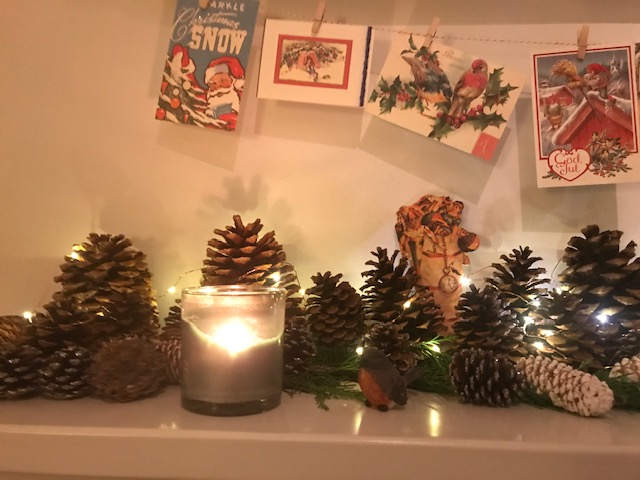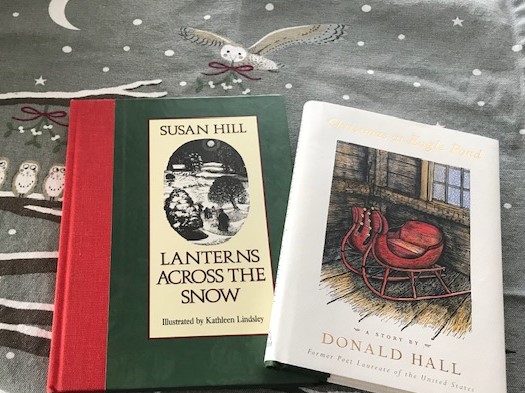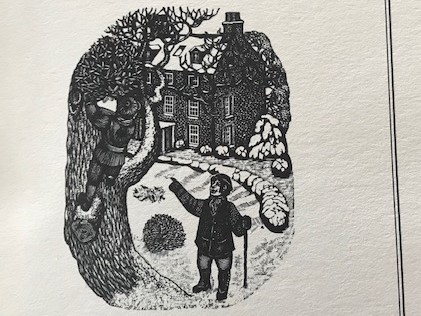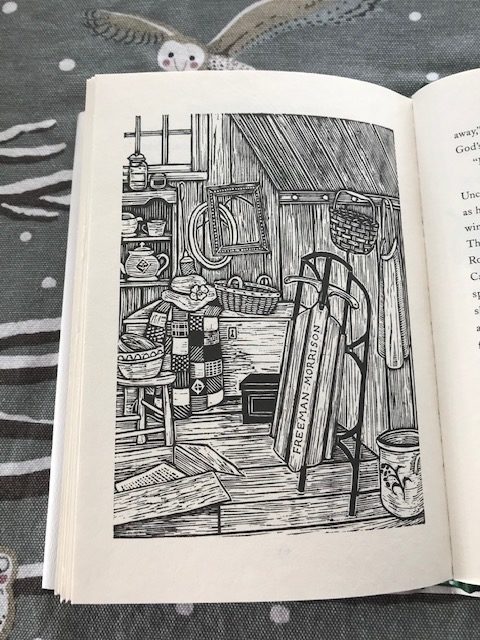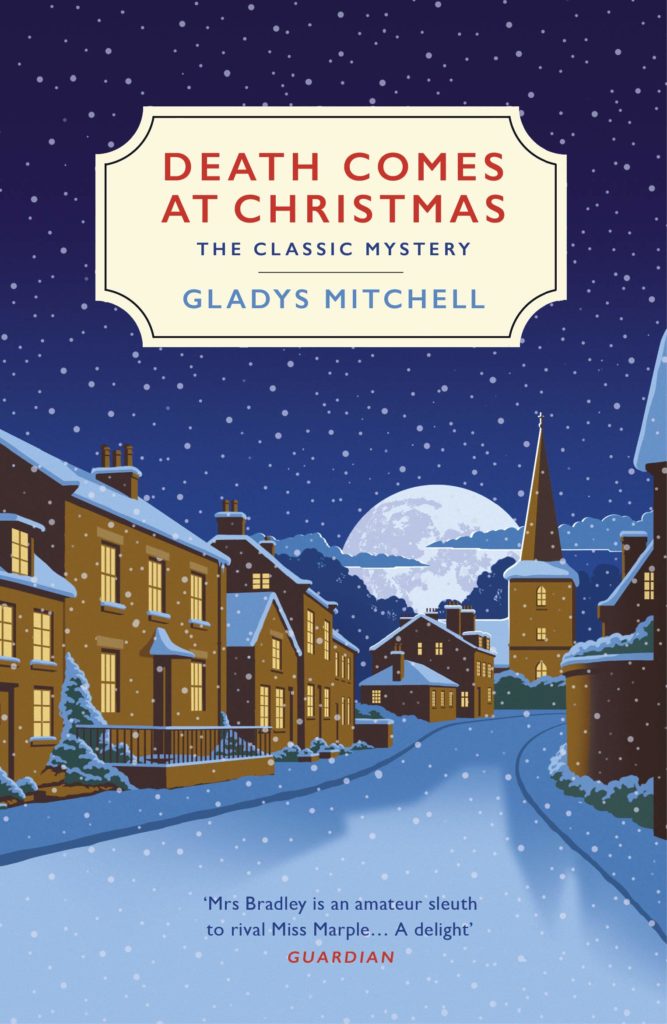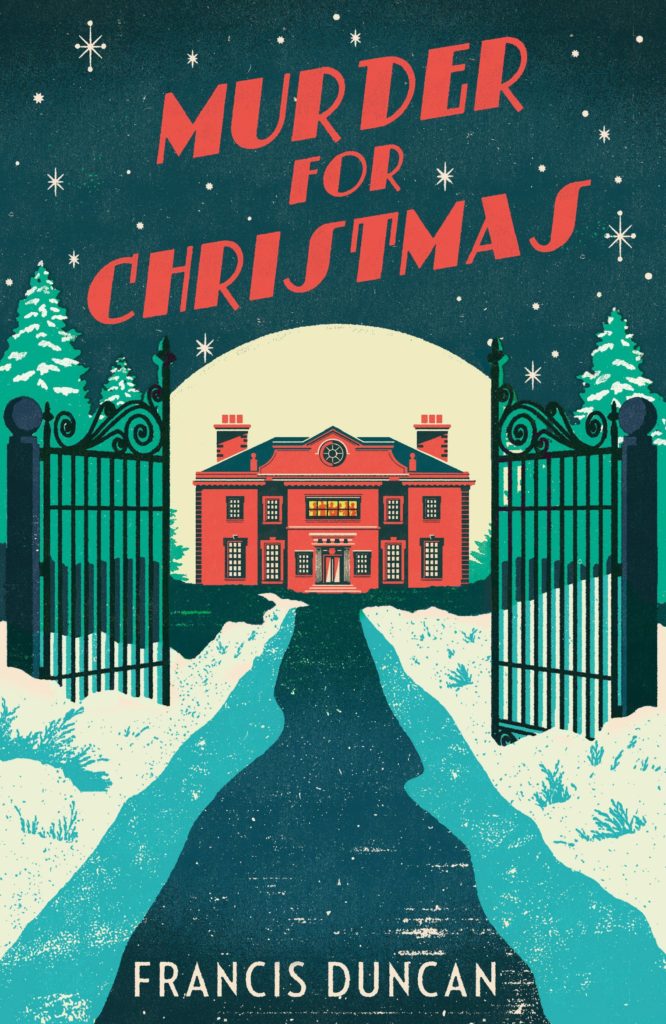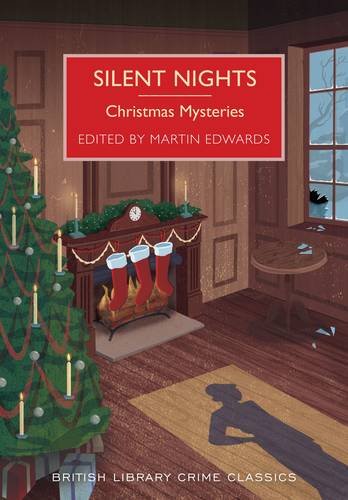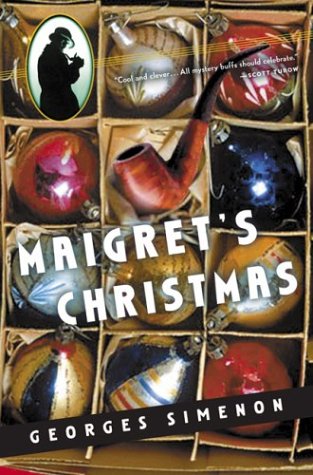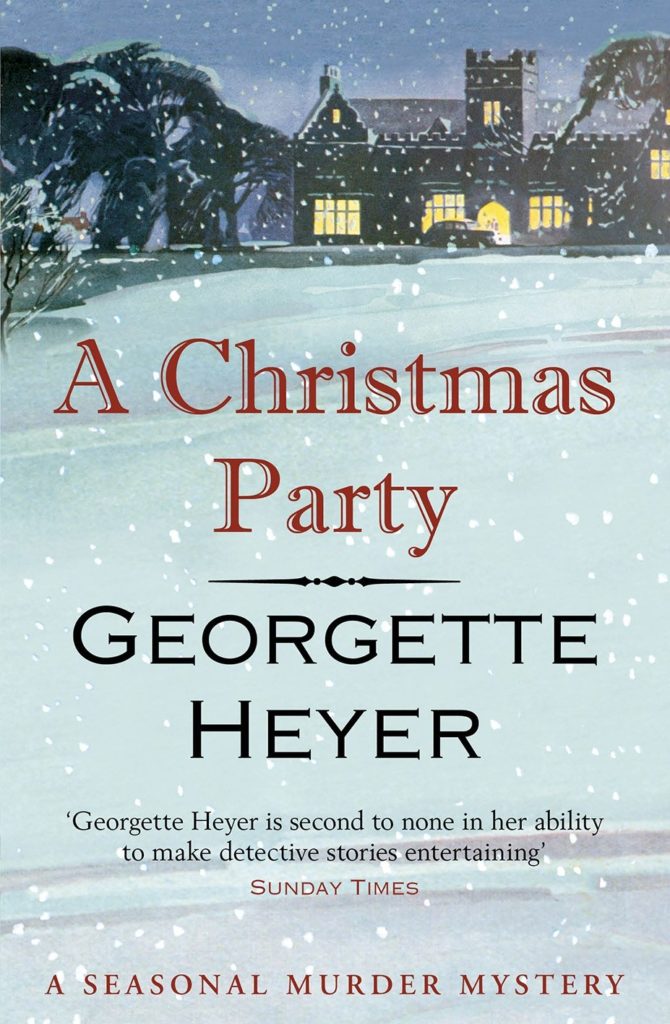Christmas Night Reading
Turns out I wasn’t in the mood for Christmas murder mysteries after all. So I pulled two slim volumes off my shelf and read them last evening in my cheery reading Christmas nook.
Both books were discovered during a 2019 hot and humid summer trip to New England – when my mind was far away from Christmas.
I discovered the first book when I was accidentally left behind at our friend’s home in Maine. Everyone else had driven off in two cars to their nearby lake cottage and each car thought I was in the other one – I had just ducked into the powder room to change into a swim suit. I was not in the least dismayed. All alone, I happily browsed the bookshelves of a kindred spirit book lover. I discovered this little treasure – read it while in front of a fan — and made note of the title so I could get my very own copy – which I did this year.
Lanterns Across the Snow by Susan Hill
This is a gentle little book about an English country Christmas at the turn of the last century. Fanny reminiscences about Christmas Eve, Christmas Day, and St. Stephen’s Day when she was nine years old.
A happy childhood is like a magic circle. Lit from within, it throws a beam forward into the present. Snow always fell on Christmas Eve, fat and soft as goose feathers, to lie like a quilt upon the ground all winter. That is what Fanny remembers, now that she is old, at another Christmas time.
This story brings back the magical of Christmas Eve and the expectation of luscious foods, that were not available every day of the year. The contrasts of cold and warmth, of hope and despair, of birth and death all wrapped up in a warm and nostalgic atmosphere. It even has some lovely woodcut illustrations.
It’s short but sweet, and would make great reading for Christmas Eve or a cold winter night by the fire.
Christmas at Eagle Pond by Donald Hall
When visiting New Hampshire, I always try to visit Toadstool Books and dip into one of their three independent bookstores, each of which are beautifully curated. This visit they had a special section dedicated to Donald Hall, the 14th US poet laureate who lived on a farm in New Hampshire. And, although it was July, I purchased this Christmas book to bring home to my collection.
In December of 1940, twelve-year-old Donnie Hall gets on a train from his comfortable Connecticut home to fulfill a dream: to spend Christmas with his grandparents on their farm on Eagle Pond in southern New Hampshire.
He tells of a Christmas in the country; family dinners, being snow-bound, horse-drawn buggies, wood-burning stoves, milking cows in a frigid barn before dawn, and making popcorn balls for the church Christmas party. A vivid portrait of a vanished New England
The illustrations by Mary Azarian are lovely and fit perfectly with the book’s tone.
I’m going to break my rule and give away this little book’s secret, which is revealed in Mr. Hall’s note at the book’s end — he never really got to spend Christmas at his grandparents’ farm when he was a boy. Instead, in his eighties, having inherited Eagle Pond Farm and done most of his greatest work as a poet there, he imagines what a Christmas at Eagle Pond would have been like for his twelve-year-old self. Based on the stories tole by his mother and his grandparents, he wanted to give himself “the thing I most wanted, a childhood Christmas at Eagle Pond.”
This is a beautifully spare and gorgeously written little Christmas tale.
Unlike my intended holiday mystery reads — these slim volumes are quite simple, don’t have a complicated plot, there’s no mystery, and no conflict. That made them my perfect Christmas night’s reading. And, what so many of us want this Christmas to be.
Christmas Reading
Despite what you may believe, Book Barmy Christmas reading is not cancelled ~~ just delayed…
Can’t really say why, no excuses just been busy with other holiday stuff. Had a sewing project and knitted gifts — all finished and on their way to their new owners.
Christmas reads were chosen ages ago, but they are gathering dust in the reading nook. The week between Christmas and New Years will be my cozy reading time. Here’s what I’m planning – as is appropriate for 2020 – I’ve chosen holiday murder mysteries – albeit with wonderful covers. They certainty look nice out on top of the bookshelf.
Never fear, Book Barmy will ride post again.
I’ll leave you with my favorite Christmas Eve tradition:
Merry Christmas everyone
Half Broken Things by Morag Joss
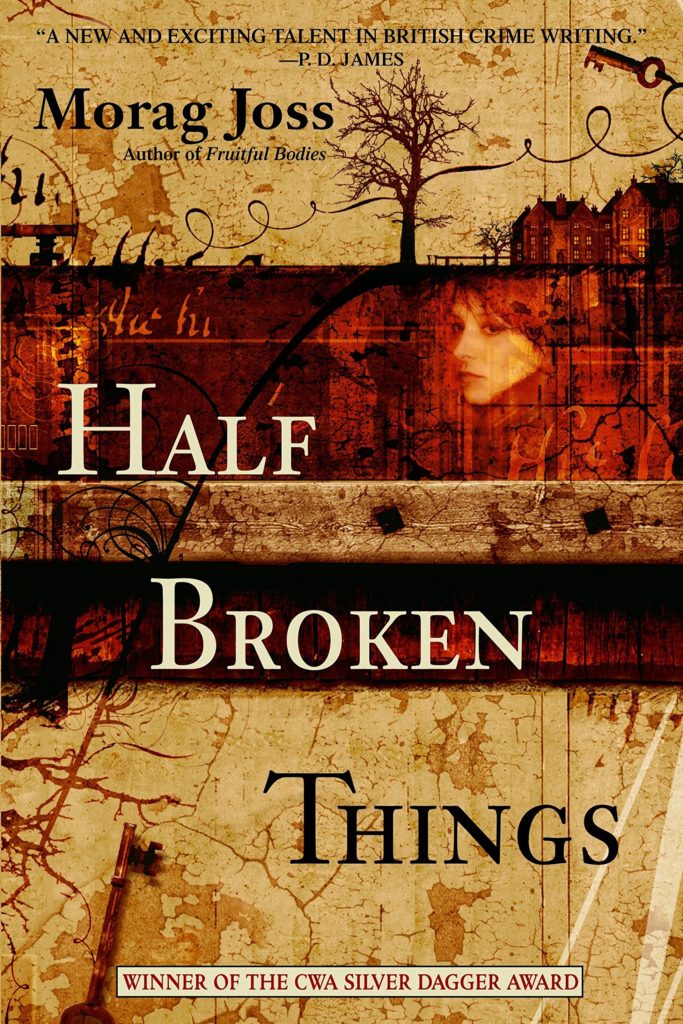
It seems only a minute ago it was Halloween, and now it’s almost Thanksgiving — but then again, early November was gruelingly slow — 2020 is playing strange time games.
I always try and read a good, creepy book over Halloween and this year, my shelves paid off. I found Half Broken Things which I got back in 2004 after I read that P. D. James (one of my favorite mystery writers) had recommended Ms. Joss’s writing.
Sixty-four-year old Jean is one of the unnoticed, a plain woman, in her final year as a house sitter. Raised in emotional poverty, Jean has muddled through the years, her mind often her only companion, a condition that allows her fictional flights of fancy in her current situation as house sitter of Walden Manor. Jean is faced with an insecure future, uncertain finances and the looming years without a real home or family:
“The old Jean simply detached herself, rose up and disappeared into the steam, like a person dissolving into fog.”
Writing a journal at the start of the novel, Jean puts the facts to paper, how she came to her current dilemma in this large and welcoming home, which she has inexplicably taken as her own while the owners are traveling. Resentful of the restrictions put upon her owners during their year abroad, Jean finds many doors locked and her access limited to a cheerless sitting room and the kitchen. She takes this as judgment of her untrustworthiness and a rude reminder of her standing as mere caretaker of other people’s things.
Nursing this subtle rebellion, while dusting and cleaning the house she accidentally breaks a teapot containing the keys to the formerly unavailable rooms and private drawers. Jean now liberated from her restrictions, slowly starts to explore the forbidden rooms, and inhabit the home. Including wearing the wife’s clothing, sleeping in the master bedroom, and taking long baths in the luxurious bathroom.
“People should have what they need, especially if they have to go without most of their lives.”
As she goes about her days in the lovely home, she discovers an extensive wine cellar and fully stocked freezer. Now fully comfortable and at home, Jean uses her imagination to invent a long lost son and places an advertisement in the local paper – seeking this imaginary son
A broke and desperate Michael answers the ad pretending to be her son with his pregnant girlfriend Stephanie. Somewhat surprised at her imaginary son actually showing up at the door, Jean leaps to accept them with no questions asked. Formerly driven by lack, Jean’s life theme has been ~~
“that good things, opportunity, security, affection, should come to me, if at all, only second-hand, and in second-rate scraps.”
Now her days are filled with her second-hand family, and their convoluted reasoning allows them to pretend that they are of the manor born. Of course, this feeble plan will come tumbling down when reality intrudes, but Jean, Michael and Steph are prepared to go to any lengths to maintain their small slice of happiness.
It’s a fascinating but twisted fairy tale — three desperate people performing increasingly desperate acts, dedicated to the well-being of the family at all costs. By turns bizarre and Gothic, Ms. Joss’ unchecked imagination has created a poignant respite for three truly half-broken things who linger on the edge of reason, their need to belong so fierce they go on to justify thievery and even murder.
I found myself quickly racing through Half Broken Things seduced by the writing and mounting tension. On one hand, I was warmed by the isolated manor house and how it gave its new inhabitants comforts and possibilities previously unavailable to them — but then holding my breath and as reality slowly descends upon their contentment.
Ms. Joss delivers a creepy yet compelling tale of complicit falsehoods. The isolation at the manor is seductive, the self made family’s self-justification completely pervasive as the three characters place need above morality in an astonishing tale of belonging at any cost.
Highly recommended – please put Half Broken Things on your list for next Halloween.
All the Devils are Here by Louise Penny
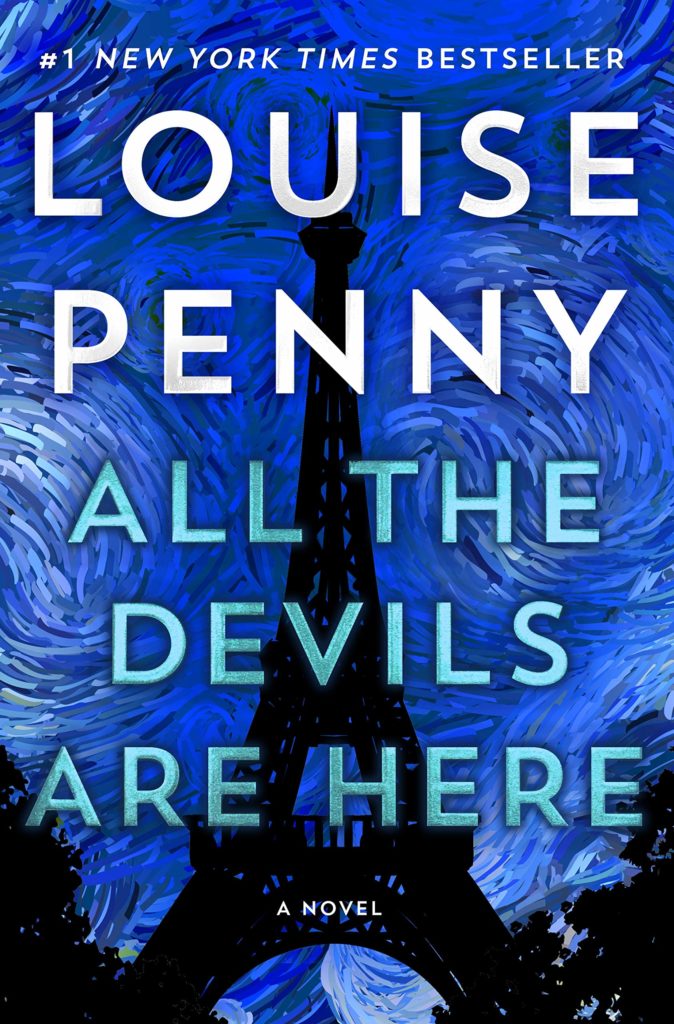
This seems like the sort of day that needs some distraction — so, I’ll tell you about the newest Louise Penny — All the Devils are Here. I got my copy through a local independent bookstore who offered a live (albeit remote) talk by Ms. Penny that included a copy of the book with purchase of the ticket — how could I refuse? The talk was great fun, she’s holed up in her London flat – and the book arrived a few days later.
Please allow me to cheat and quote another reviewer – whose review captures the essence of this newest installment better than I ever could….
“Penny’s series has always been about the complexities and sustaining glories of family, and here she takes that theme even further, revealing fissures in the Gamache clan, but also showing the resilience and love at its root. Series devotees will revel in both Penny’s evocation of Paris―every bit as sumptuous as her rendering of Three Pines―and in the increased role she allots to librarian Reine-Marie, whose research skills are crucial to untying the Gordian knot at the mystery’s core.”
―Booklist (starred)
I’ve read some excellent books this year and All the Devils are Here is right up there as one of the best. Unlike the previous books in this series, it’s not set in the charming village of Three Pines, Quebec — but in Paris – que diable? I wondered if this would matter, but I’ve always found Ms. Penny’s books to be excellent and, as usual, from the very first page I was hooked. In fact, the Paris setting is beautifully rendered and almost as enthralling as being there. Ms. Penny has captured Paris and it’s environs — from the Musée Rodin and its gardens, to the Place de la Concorde.
Chief Inspector Armand Gamache and his wife Raine-Marie have come from Canada to Paris for the impending birth of a new grandchild. After a celebratory dinner with their two children, spouses, and Armand’s billionaire godfather, Stephen Horowitz, Stephen is deliberately struck by a vehicle and lies in a coma. A grim discovery at his apartment prompts an investigation and the uncovering of family secrets leaving Armand to determine just who can be trusted.
The Prefect of Paris police, an old friend, may be corrupt. Jean-Guy is insecure in his new job, does not know why he was hired or who to trust as a mystery unfolds at his engineering firm. Daniel and Ros may be living above their means. But, above all, Armand’s godfather Stephen is on life-support. And, he knows something.
From there the story unfolds and the tension mounts, as Gamache probes the unanswered questions — why Stephen has been in Paris longer than they knew, why he moved from his apartment to a hotel suite, and why he has kept a very important project a secret. It is a very complicated plot, and the reader needs to have his wits about him exceedingly complex tale of international finance and deals.
All the Devils are Here reveals additional insight into Gamache’s background, his family and, for the first time, his troubled relationship with his son Daniel. I was pleased that, in this installment, Reine Marie is even more of a presence and has a very significant role when her profession as a librarian researcher proves vital.
And, just in case you’re wondering about the title —
“When we first sat down, you said that Hell is empty and all the devils are here. What did you mean?” “It’s one of my favorite quotes, you know that,” said Stephen. And Armand did. Stephen loved to use the lines from The Tempest to unnerve business rivals, colleagues. Friends. Strangers on planes.”
The only part I had trouble with was with the character of Daniel, Gamache’s son, who has had a lifelong antipathy toward his father which strained credibility and had me muttering ‘oh grow up’ at his whining.
As is typical of a Louise Penny novel, there are revelations which are heart-breaking; and others, joyous. Throughout, she offers a solid story about honor, justice, love, family, and friendship. Oh, and of course, murder.
I learned many new things and feel richer for having read her words. I’m so glad Ms. Penny keeps writing this wonderful series. Keep ’em coming!
—————————————————————————-
Be sure to read the acknowledgements after finishing All the Devils are Here, here not only does Ms. Penny reveal background into her characters, but also opens her heart about her life and writing.
Good Book ~~ Wrong Time
Sometimes you have a good book in your hands — one with great reviews and hailed as a must read — but the timing is wrong. Somehow it just doesn’t take. Pick it up, put it down – try again – re-read the back cover and the author profile — just trying to get inspired.

The Vanishing Half
by Brit Bennett
I had requested this book ages ago from the library, after my pledge to read and learn more about the black experience and racism.
The NY Times called it “a stunning new novel about twin sisters, inseparable as children, who ultimately choose to live in two very different worlds, one black and one white.”
The Vignes are identical twin sisters and after growing up together in a small, southern black community and running away at age sixteen — their lives have taken very different paths. Years later, one sister lives with her black daughter in the same southern town she once tried to escape. The other, now living in California, secretly passes for white, and her white husband knows nothing of her past. Even though separated by many miles and just as many lies, the fates of the twins remain intertwined. And as a multi-generational saga the book story line will take the reader to the next generation, and their own daughters’ fates.
Sounds really good doesn’t it? At first I was intrigued by the perceptions of shades of black within the black community. Not to mention, a compelling study of race and interracial tensions.
The Vanishing Half opens with the story of the twins growing up light skinned in the South, their eventual escape to New Orleans, and one of the twins (sorry can’t remember which one) goes back home having escaped an abusive marriage and with a dark skinned daughter in tow. I plowed on — trying to care, or even get interested. Such an interesting premise, I keep telling myself. But alas, no spark — no book tingle.
And, I did get about 75 pages in before I just gave up. That’s about when the author moves forward in time and we meet one of the twins’ daughters and her issues not only with her race but her sexual orientation. And, at that point folks, I just couldn’t go on, I couldn’t care less And, after trying to read just one more chapter — in frustration, I clicked the button and digitally whisked my copy back to the library for the many readers still on the waiting list.
Give it a try, perhaps you’ll enjoy The Vanishing Half. It has been reviewed and judged as an important book, and even an admirable book, but just the wrong time for this reader. I may try again in the future – again I blame it on timing.
Full disclosure: During my attempt to read this book, the newest Louise Penny arrived — teasing me on the shelf – calling me, charming me.

I have no regrets, never looked back, and hurried off to my new read love.
Perfect Book ~ Right Time
My time is not my own right now, and my reading has fallen to the wayside. Let’s just say, it’s almost over and things are not going in favor for our little neighborhood association — as the saying goes, you can’t fight city hall, or it turns out, a rich, private school.
Several weeks ago, a package arrived on my doorstep – a book from a dear friend who lives five hours away.
Quite unexpected, because no one ever gives me books – being naturally afraid either; I already have it (very likely), I’ve already read it (also highly probable), or I knew about it and just wasn’t interested (happens frequently). But this little gem was totally unknown to me.
The Boy, the Mole, the Fox and the Horse
by Charlie Macksey
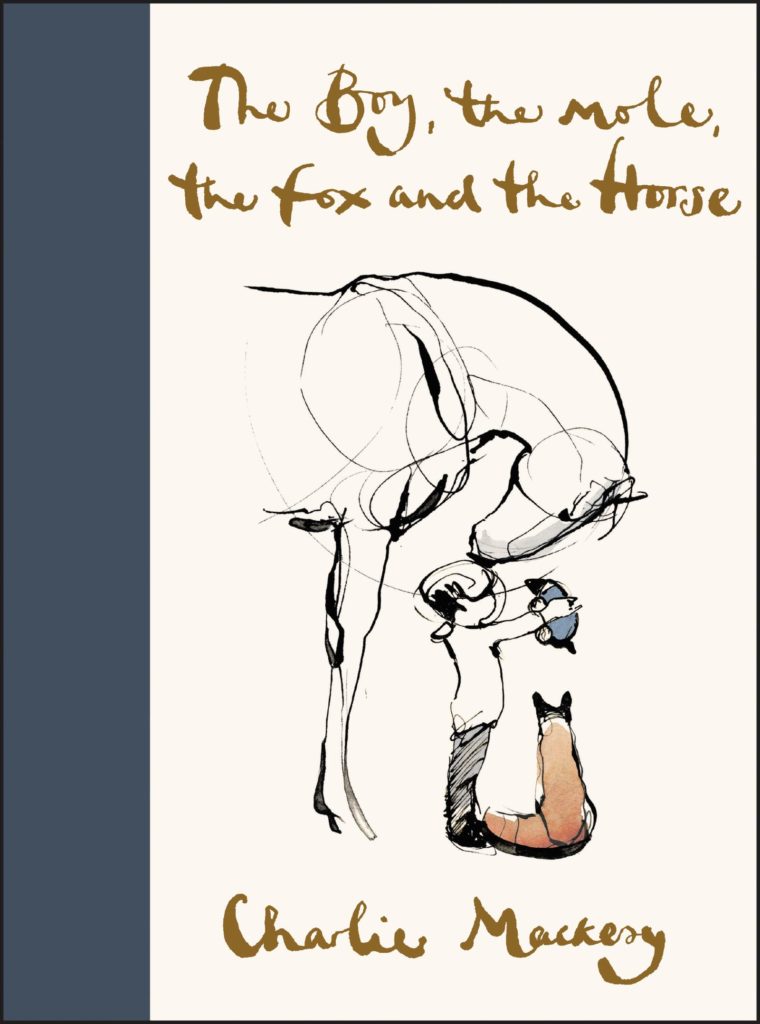
Too exhausted to read anything dense late one evening, I sat down with this little treasure and started with the introduction — which talks directly to the reader. This caught me off guard and drew me right into this fairy tale-fantasy-picture book.
Called a book of hope for uncertain times, it did seem to speak to my poor soul — so bruised as it is right now.
It’s a simple story with some lovely art.
There’s a lonely boy, who meets a mole who loves cake, a wary fox, and a gentle horse.
There is a sweet simplicity yet complexity in the inspirational messages.
“What do you think is the biggest waste of time?
Comparing yourself to others, said the mole.”
Then this illustration stopped me cold — I stared sadly at it for a long time.
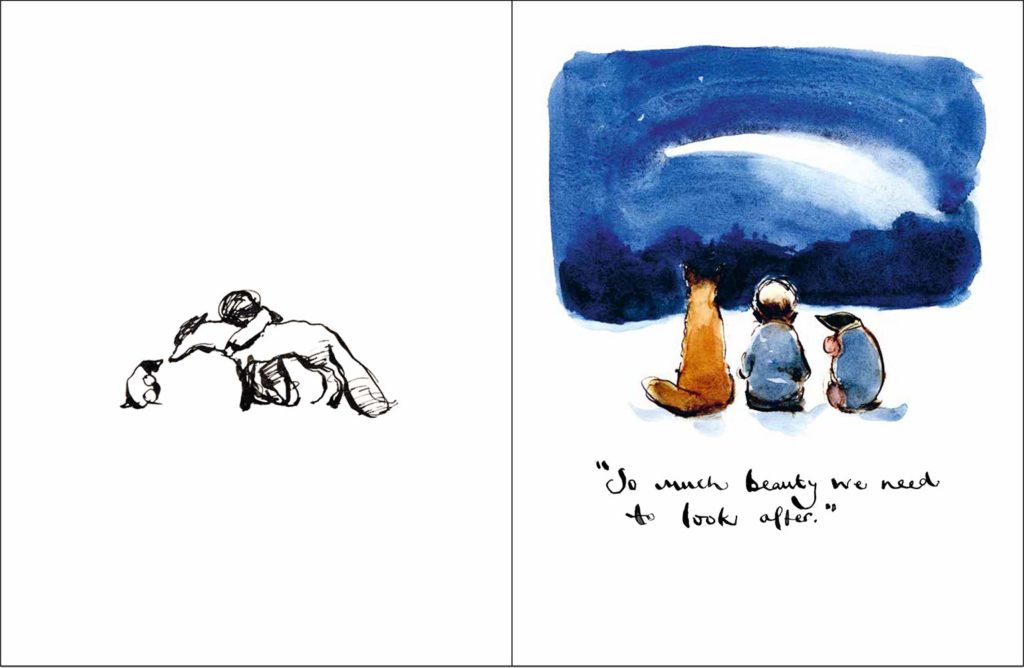
As I slowly turned the pages, I read about friendship, hope, hugs, cake and slowly felt my shoulders relax and my stress level lower.
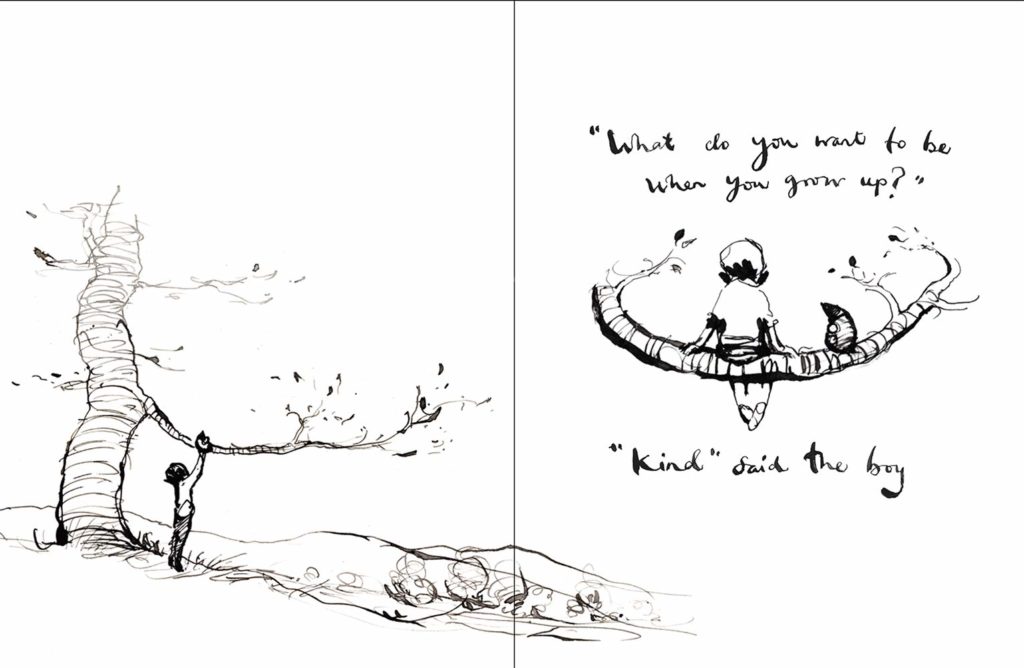
“We often wait for kindness….but being kind to yourself can start now.”
I was reminded of Winne the Pooh or The Little Prince, both of which offer wisdom for adults and fantasy for children.
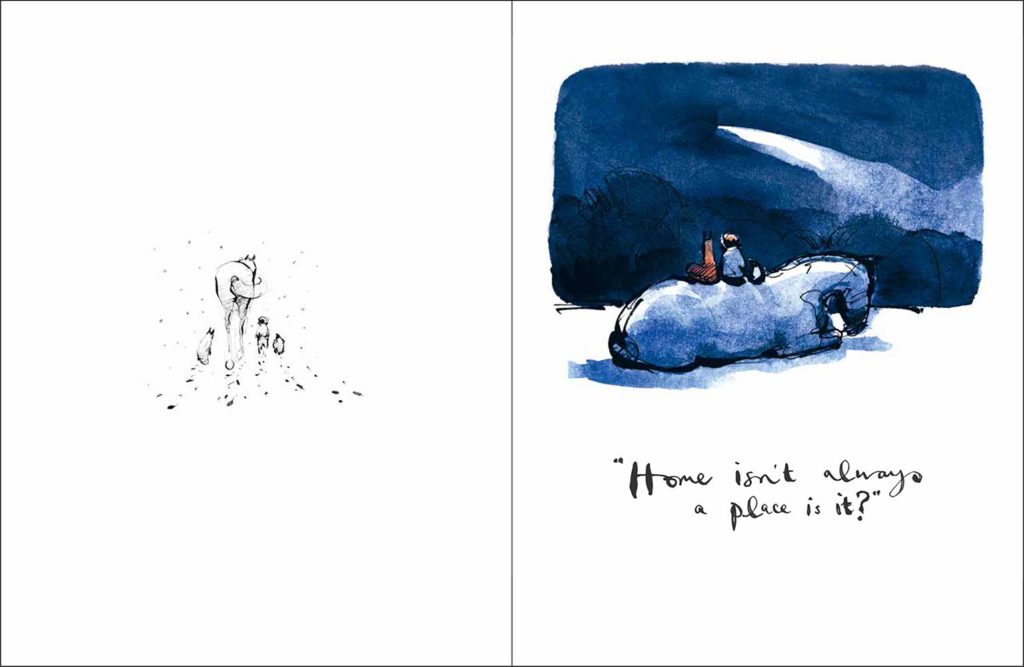
As you can see, the illustrations with their lines and brush strokes are delightful. The artwork fairly glows off the pages. You’ll want to hold the book in your hands, turn the pages yourself, and see the magic for yourself.
Fair warning, the book has been criticized as cliched and saccharine, and perhaps it is.
But for me – it was the perfect book at the right time.
I went to bed wonderfully comforted and ready to sleep.
And, as I drifted off, I thought I need to revisit Pooh and his merry band


